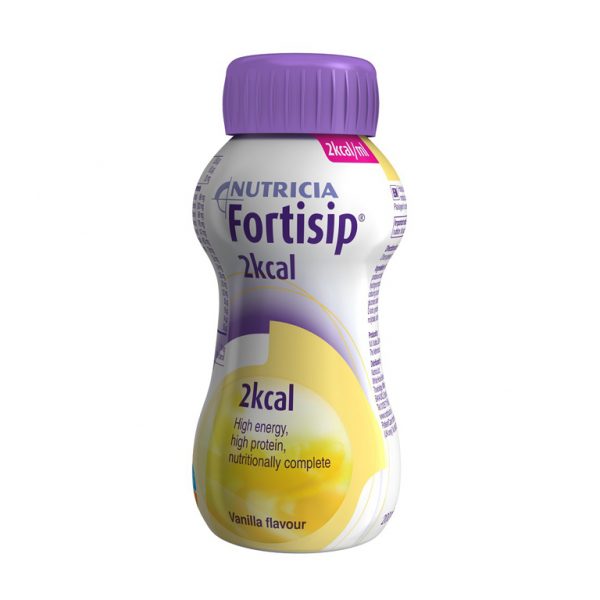
Product Information
A ready-to-drink, high energy, high protein, nutritionally complete oral nutritional supplement.
Link copied!
Indications
For the dietary management of:
- Disease-related malnutrition.
- Patients with high energy and protein requirements.
- Patients requiring a residue restricted diet.
Important Notice
- Not for parenteral use.
- Not suitable for patients with galactosaemia.
- Not suitable for patients with cow’s milk protein allergy.
- Not suitable for infants and children under 3 years of age.
- Use with caution in children aged 3-6 years of age.
- Must be used under medical supervision.
Directions for Use
- Shake well before use.
- Best served chilled.
- Usage to be determined by a healthcare professional.
Storage
- Store in a cool, dry place.
- Once opened, close the bottle and store in a refrigerator.
- Discard unused content after 24 hours.
Order Information
To order contact Nutricia Customer Experience 1800 889 480
| Fortisip 2kcal | Presentation | Code | Units per carton |
| Vanilla | 200ml bottle | 172125 | 24 |
Ingredients
Full ingredients list and nutritional information available on the product fact sheet.
How Your Patients Can Access and Buy Fortisip
There are multiple ways in which your patients can purchase Fortisip®, depending on their preferences and circumstances, discover the options available here.
Allergen & Cultural Information
- Contains: milk and soy.
- Halal certified.
- Nutricia UK and/or Ireland have Kosher approval for this product.
- No gluten containing ingredients. No detectable gluten when tested to a sensitivity level of less than 5 parts per million (<5 ppm i.e. <5mg/kg).
- Low lactose (lactose <2g/100g).
References
- Milne AC, et al. Protein and energy supplementation in elderly people at risk from malnutrition. Cochrane Database Syst Rev. 2009; 2.
- Ross PJ, Ashley S, Norton A, et al. Do patients with weight loss have a worse outcome when undergoing chemotherapy for lung cancers? Br J Cancer. 2004;90:1905-11.
- https://www.nrv.gov.au/nutrients/vitamin-d. Accessed Nov 2, 2020.
- ter Borg S, Verlaan S, Hemsworth J, et al. Micronutrient intakes and potential inadequacies of community-dwelling older adults: a systematic review. Br J Nutr. 2015;113(8):1195-206.
Additional Information
^In accordance with Australia New Zealand Food Standards Code – Standard 2.9.5
